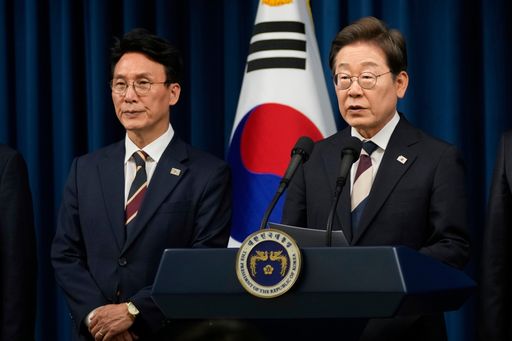Japanese Prime Minister Shigeru Ishiba spoke by phone with South Korea's newly elected President Lee Jae-myung to discuss bilateral relations, the Tokyo-based Kyodo News has reported, citing an anonymous government source.
Monday’s phone call was the first contact between the two leaders since Lee took office on Wednesday.
The two leaders are expected to discuss the possibility of their first face-to-face meeting, with Ishiba emphasising the importance of dialogue and cooperation as "partners" in addressing global challenges.
Ishiba is expected to attend the G7 meeting beginning on Sunday in Canada. While South Korea is not a member of the G7, the presidential office has announced that Lee has accepted Canada's invitation to participate in the multilateral huddle.
Despite obstacles stemming from Japan's 1910-1945 colonial rule of the Korean Peninsula, ties between Tokyo and Seoul significantly improved under the administration of Lee's predecessor, Yoon Suk-yeol, who was ousted over his aborted martial law attempt in December.

A trial of President Lee
Meanwhile, a Seoul court said on Monday it will indefinitely postpone a trial of President Lee on charges of violating election law in 2022.
South Korea's Supreme Court ruled in May, before Lee was elected, that Lee had violated election law by publicly making "false statements" during his 2022 presidential bid, and sent the case back to an appeals court.
The Seoul High Court, which had scheduled a hearing for the case on June 18, said on Monday that it will postpone the hearing "to be decided later" without a date, a court spokesperson confirmed.
Lee's office did not immediately respond to a request for comment.
The court said its decision to postpone the hearing was due to "Constitution Article 84", without elaborating.
South Korea's Constitution, Article 84, says a sitting president is "not subject to criminal prosecution while in office" for most crimes.
However, legal experts are divided on whether that applies to ongoing trials that were already prosecuted before a president was elected.
The National Court Administration under the Supreme Court gave as its opinion that judges of each court where Lee's trials are being held will have to decide whether to stop or proceed, according to its statement to a lawmaker in May.
"The court in charge of hearing the case will determine whether Article 84 of the Constitution should be applied to a criminal defendant who was elected in the presidential election," the statement said.
Lee's ruling Democratic Party, which controls parliament, is planning to pass a bill this week that suspends ongoing trials for the incumbent president, local broadcaster KBS reported on Monday.
The Constitutional Court may be asked to rule whether the bill is unconstitutional, legal experts have said.















